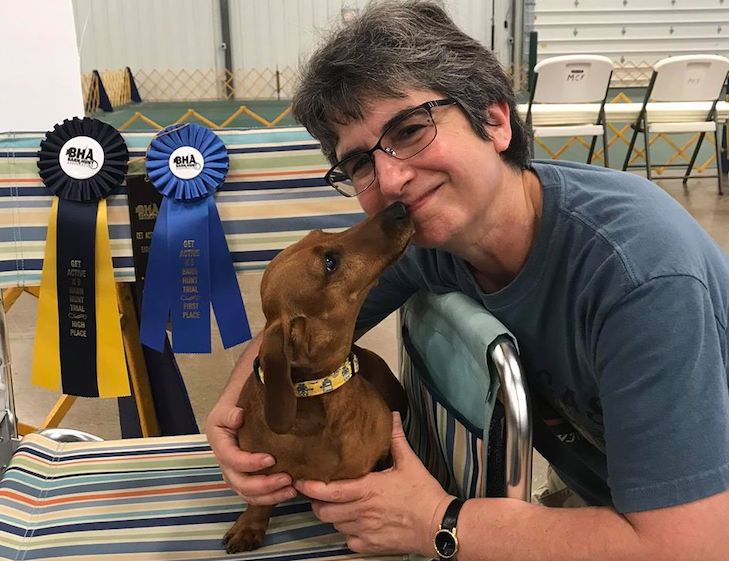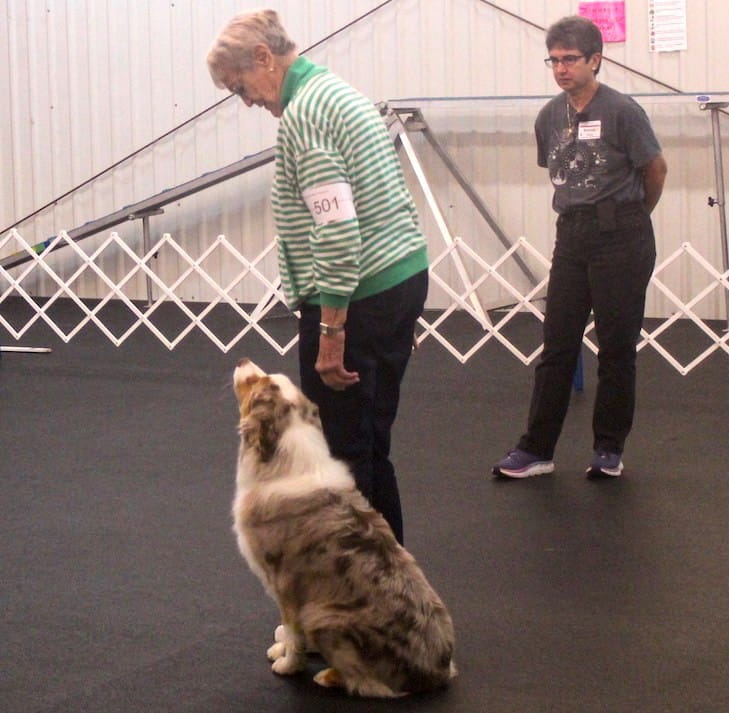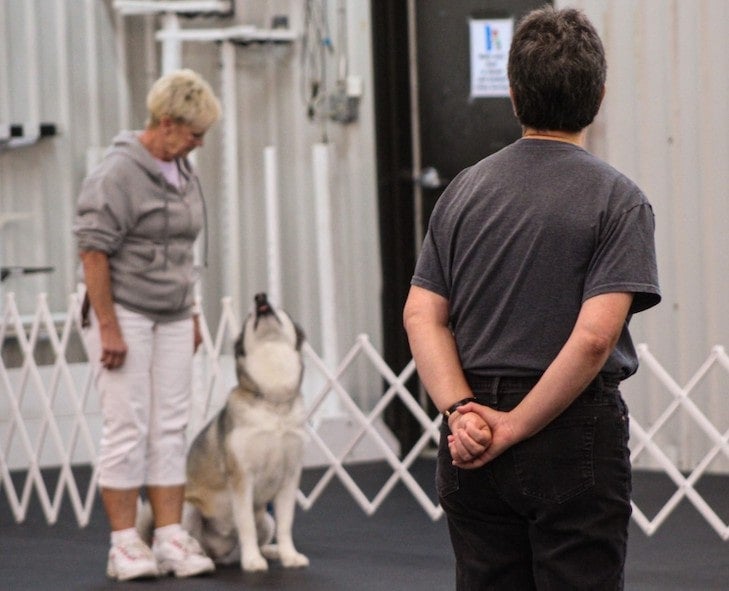
Brenda Riemer grew up a California girl surrounded by sunshine, sand, and surf. These days, though, she struggles with another “S” element – snow. All of these, however, have sublimely shaped the dynamics affecting the sport psychologist/mental skills trainer and her approach to teaching dog handling seminars nationwide.
“I hate snow,” Riemer says. “I hate winter. As someone who grew up in L.A., driving on snow and ice is the most stress-producing event for me, exceeded only by trying to walk on ice. This is where I realized that the tools I know and love could help me in other areas of my life. I use breathing techniques and positive self-talk when I drive in this mess.”
Putting Principles Into Practice
So what do her winter Snow-mageddons have to do with dog training?
“It gives me a chance to put to practice the principles I teach students,” she answers. “The philosophy behind my seminars is that people are not born with perfect mental skills for the dog sports ring. Just as dogs are not born knowing how to perform perfect heeling, fronts, or finishes. Ring nerves can be overcome with practice, whether competing in conformation, Obedience, Rally, Agility, or another dog sport.”
Riemer earned her Ph.D. in Sport Psychology from Michigan State University in 1996. Since then, she has taught sport psychology at the college level, along with working with college and high-school athletes. She presently teaches at Eastern Michigan University in Ypsilanti. Riemer began training dogs in 1996, as well, incorporating sport psychology into her regimen from Day 1.

“It was not a conscious decision,” she recalls. “I was utilizing mental skills like goal setting and imagery without labeling them as such. The tools of sport psychology are a part of me. I saw no reason they could not be put to use for dog handlers, too, who put a lot of undue stress on themselves, both in the midst of and the build-up to competition.”
In that respect, this teacher has walked the walk before she talks the talk. She has competed in a wide array of AKC dog sports, earning many titles. What separates her from other trainers is her laser-sharp focus on the handler rather than the dog. Much of her training is directed on imagery and the ways it can be used to help reduce stress and improve performance.
“People are amazed how just picturing a dog show can cause a stress reaction,” Riemer emphasizes.
An Alternative Approach To Dog Sport Psychology
The beginning of each two-day seminar is designed to give an understanding of mental skills and their proven effectiveness in all parts of life. Riemer then introduces techniques including breathing, imaging, and relaxation. Those who have signed up for ring time receive the most hands-on experience when they engage in live “run-throughs” the following day. Before each seminar, all enrollees receive a form asking them to detail their backgrounds. This enables Riemer to tailor examples to their needs.
Longtime Seattle-area dog trainer Kathy Lang was introduced to sport psychology in the 1980s and recognized its relevance to competition dog obedience. At that point, books and audiotapes she was able to uncover were written chiefly by college and professional athletes, but not for dog sports. However, they did provide food for thought. Eventually, Lang met Riemer through Facebook and quickly recognized she had the insights, credentials, and experience that the world of dog sports needed. Lang was so taken with Riemer’s training style that she invited the latter to Seattle to perform seminars in 2016 and 2017.
“Mental preparation impacts everything,” Lang explains. “That proper mindset by the owner makes both training and competition better for the dogs. Many training challenges have little to do with the dog or the exercises, rather they relate to the handler’s psyche. I have to find ways to coach the student through the mental challenges and help him or her believe that not only can their dog do it, but they can successfully train their dog to do it! Mental management is a critical piece of the complex puzzle called success.”

Mental Skills Seminar Success Stories
Ingrida Robinson, a dog training instructor in Washington, has attended three Riemer seminars. Robinson admits to struggling with self-confidence, especially in obedience when she was meant to be leading her dog. In 2016, she attended her first seminar and recalled the powerful, emotional aspect of the imaging.
“Many people in the audience lived through the emotions that came through my facial gestures, tightened and untightened fists, foot movements, hard swallows as I sat in a chair in front of them with my eyes closed while Brenda talked me through imaging,” Robinson says.
Before an October seminar, Robinson had been struggling with her Petit Basset Griffon Vendeen Rupert. Some frustration was due to the complexity of obedience exercises, but Robinson’s confidence was waning at times. Post-seminar, the team qualified in Utility A three consecutive times, earning their UD. Even high-level dog sport competitors like Robinson can struggle with the mental aspect of competition, but Riemer’s approach has proven to be uniquely helpful.
An admitted skeptic with a scientific background, Christine Swinehart was drawn to Riemer’s recent seminar. She was intrigued by the instructor’s application of evidence-based information to produce results for both high-performing athletes and dog trainers. Swinehart, the owner of a 6-year-old mixed breed named Savannah, found that Riemer’s total focus on the handler met her needs perfectly.
“It taught me to recognize I have more control over the outcome in the ring than I thought,” Swinehart says. “My thoughts can set me up for success or failure. The competition experience in a large part is what I make it. Was I prepared? Did I do the work ahead of time? And most important, did I have fun with my dog?”
In Support of Sport Psychology
Longtime competition obedience participant Bonnie Burman found Riemer’s techniques to combat ring nerves particularly helpful. Some of her most effectual takeaways included breathing methods and imagery to increase relaxation and reduce stress, changing negative self-talk to positive thoughts, practical tips like maintaining a routine on show days, setting realistic goals, and concentration exercises.
“Bottom line, it’s all about being the best teammate for your dog,” Burman says. “Improving our mental game frees up our thoughts and allows us to concentrate on what we need to do to help our dogs do their best work.”

Obedience competitor Lou Ann McGahey recently attended two Riemer seminars and left with a few key impressions:
- Perspective! It’s just a dog show, after all.
- Patience. There are times when you encounter problems that cannot be solved quickly.
- Have fun. Don’t let anything or anyone suck the fun out of the activity you love.
- Set realistic goals. Sometimes you may adjust long- or short-term goals, and that’s OK.
- Focus. It’s possible to recover from a mistake quickly by interrupting negative thoughts.
“This is just a hobby and all our journeys are different,” Riemer affirms. “Savor every moment. Too many competitors focus on results or social comparison, which can lead to increased stress and reduced focus in the ring. Trust your dog. If you do not have that trust, you’re more likely to be absorbed on what might happen negatively than on your performance.”

